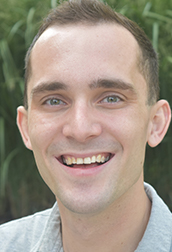By Tyler Heston, Minister to Youth
The snow, even days after it has fallen and as it turns brown and black from foot and road traffic, is absolutely wonderful to me. The frozen precipitation paints fresh beauty into familiar landscapes.
Snow days give an opportunity to find pause from normal activities and spend time with family and friends outside sledding and making snow-people, or inside drinking hot chocolate and watching movies. My favorite effect of the snow, though, is the hush it breathes over the places it falls.
People keep reminding me that the thrill of snow will wear off (this recent snowfall is easily twice as much as I ever saw living in Tennessee and Texas), and that I’ll soon find myself frustrated by the power outages, frigid chill, and other dangers and inconveniences of winter weather. I’m sure the charm will dwindle, but I’m not sure if the quiet of snow will ever lose its magic.
Whenever I walk outside, whether it’s through the park with a friend or down the block from my car to my apartment, I can feel the snow absorbing the sounds of the city around me. This quiet is more than aesthetic pleasure; it’s a call to to be present to the world around me. The stillness brought by the snow reminds me to myself be still.
I’ve been reading Hermann Hesse’s Siddhartha this month, a short novel that tells of a restless young man’s spiritual quest for wholeness and enlightenment. There’s one moment where the main character, named Siddhartha, leaves one religious community to follow his own way. Hesse writes,
Siddhartha learned something new on every step of his path, for the world was transformed and he was enthralled… He saw trees, stars, animals, clouds, rainbows, rocks, weeds, flowers, brook and river, the sparkle of dew on bushes in the morning; birds sang, bees hummed, the wind blew gently across the rice fields. All this, colored and in a thousand different forms had always been there… The world was beautiful when he looked at in this way— without any seeking, so simple, so childlike… All this had always been and he had never seen it; he was never present. Now he was present and belonged to it.
The stillness of the snow sends me to a similar place; it stills my spirit and shows me that I belong to the world in which I live. Psalm 46 contains a well-known line from the Hebrew Bible: “Be still and know that I am God.” In stillness, when we are truly present to the things around us, we see clearly the reality of things and hear God’s quiet voice telling us that we belong.
According to the church calendar, we are now in the season of Epiphany, a time to seek the things of God in the world around us, just as the magi sought and found the Christ child in Matthew 2. The stillness of snow invites us into an epiphany experience, inviting us to be present to the God who is pulsing through the beauty and brilliance of the world to which we belong.




